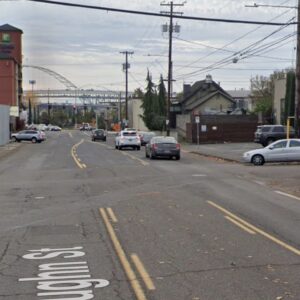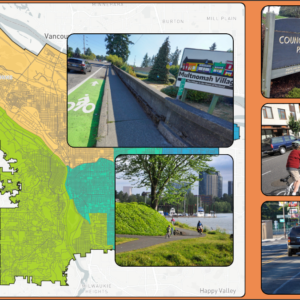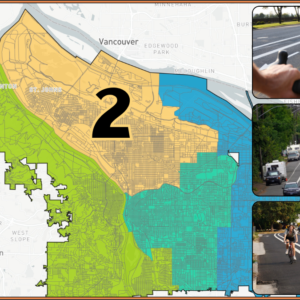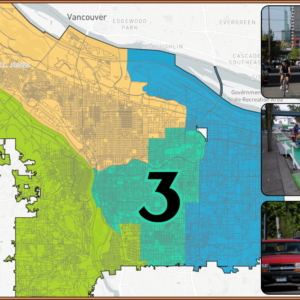“To insure that the City of Damascus is open as much as possible to the free flow of vehicular traffic and citizen travel within the city…”
— Text from a ballot measure that would prohibit public mass transit in Damascus
A ballot measure to be voted on in March in the city of Damascus, Oregon — a small town just 20 miles southeast of Portland — seeks to prohibit public mass transit.
Measure 3-350 (full text below) would amend the Damascus city charter in two important ways: It would direct the City to not “grant monopoly status” to any agency that wants to operate “public mass transit” in the city, and it would directly prohibit public mass transit within the Damascus city limits.
According to the text of the measure, prohibiting transit is necessary, “To insure that the City of Damascus is open as much as possible to the free flow of vehicular traffic and citizen travel within the city…”
I called Damascus City Manager Jim Bennett to learn more. According to Bennett, this and three other measures on the ballot for a March 9th Special Election were brought forward by a group named ASK Damascus.
Bennett refers to ASK Damascus as an “anti-government, anti-tax kind of a group” and says this isn’t the first time they’ve put measures onto the ballot. Two years ago, they were successful in passing a measure that requires a vote from the public before the City can increase any fees or new taxes.

As for Measure 3-350, Bennett says it could gain traction and possibly even pass:
“I definitely think it could get support. In a very small community like Damascus, since we’re so spread out, it’s really hard to gauge public support or opposition, but I’d say it stands a reasonable chance of getting adopted.”
Damascus has just around 10,000 residents, of which there are about 7,000 registered voters. Bennett estimates that, depending on the turnout (which he says would be about 1,500 to 2,000 voters), “it wouldn’t take more than 800 to 900 votes to pass something like this.”
I asked Bennett what would happen if it passed. “Nothing would happen right away, it’s a matter of what impact this could have down the road if TriMet and/or Metro wanted to move forward with any plans.” If there was official movement toward a mass transit line in Damascus, Bennett said this measure could result in a legal challenge.
In September of 2008, TriMet spokesperson Peggy LaPoint told The Oregonian that Damascus was “on our radar” but that it wasn’t yet dense enough to expand into. Since then, TriMet has opened their new Green Line light rail which goes to Clackamas Town Center, a mere six miles west of Damascus.
Local transit blogger Chris Smith says that Damascus was one of several cities that opted out of TriMet back in the 1990s because they didn’t feel they were getting adequate value in exchange for paying TriMet’s payroll tax (which is their primary means of operating revenue).
We’ll keep you posted on the results of the election.
Full text of Measure 3-350
BALLOT TITLE
AMENDS DAMASCUS CHARTER TO RESTRICT PUBLIC TRANSIT IN THE CITYQUESTION
Should Charter be amended to prohibit monopoly status for public transit providers and to prohibit mass transit rail within Damascus.SUMMARY
This measure would amend Chapter IX of the Damascus Charter by adding new language to Chapter IX to read:Public Travel and Transport
To insure that the City of Damascus is open as much as possible to the free flow of vehicular
traffic and citizen travel within the city,a) the city of Damascus shall not grant monopoly status to any public or private provider of
transport or transit.b) No public mass transit rail will be allowed within the city limits.







Thanks for reading.
BikePortland has served this community with independent community journalism since 2005. We rely on subscriptions from readers like you to survive. Your financial support is vital in keeping this valuable resource alive and well.
Please subscribe today to strengthen and expand our work.
Interesting.
For that matter, isn’t it the case that TriMet has abandoned service in select parts of the west hills within the Portland city limits where local homeowners associations have replaced TriMet with a private shuttle service?
I wonder what the cause and effects are of that, if that rumor is true.
Isn’t Damascus the failed result of expanding the UGB last time around ?
They have the horribleist no-soul, cookie-cutter, worst-example-of-sprawl housing tracts out there.
Even so, I have high hopes that the citizens of Damascus will see through this and do the right thing. Good luck.
By my reading of the measure (as this article quotes it), the measure would only prohibit rail, not public transit in general.
I do not get their city planning. Another thing I have noticed is this town has little to no city parks or open spaces.
http://ci.damascus.or.us/references/misc/Draft%20Comp%20Plan%20Map%20110408.pdf
If you put this map over anywhere in Portland you would have several parks or places for the public to play and enjoy the outdoors.
Peter (#3), I read the measure and it is confusing. In the “Question” part it specifically says rail, but then in the “Summary” it says, “a) the city of Damascus shall not grant monopoly status to any (emphasis mine) public or private provider of transport or transit.” Now that sounds like it can mean “no bus” too.
If that’s the case, it seems a bit absurd be against bus service “To insure that the City of Damascus is open as much as possible to the free flow of vehicular traffic and citizen travel within the city…” I’m guessing in a “city” the size of Damascus “bus service” would mean a mini-bus every couple hours during the weekday, at best. Don’t see much impediment of travel there.
Peter (#3), I read the measure and it is confusing. In the “Question” part it specifically says rail, but then in the “Summary” it says, “a) the city of Damascus shall not grant monopoly status to any (emphasis mine) public or private provider of transport or transit.” Now that sounds like it can mean “no bus” too.
If that’s the case, it seems a bit absurd be against bus service “To insure that the City of Damascus is open as much as possible to the free flow of vehicular traffic and citizen travel within the city…” I’m guessing in a “city” the size of Damascus “bus service” would mean a mini-bus every couple hours during the weekday, at best. Don’t see much impediment of travel there.
I have more and more trouble distinguishing these rabid anti-tax, libertarian types from anarchists. Once they’ve “drowned government in the bathtub”, how do they propose to maintain civic life?
Wow. Well, it’s their city! Hope they enjoy being stuck in it.
What a great example of certain societies “getting it all wrong.”
Wow. Well, it’s their city! Hope they enjoy being stuck in it.
What a great example of certain societies “getting it all wrong.”
Smacks of the Anti-Planner…
Smacks of the Anti-Planner…
It doesn’t matter if they prohibit rail. Damascus will never be dense enough to justify rail or even BRT transit. The most likely scenario is that it will cave once housing prices stop boosting the city and it will be full of foreclosures
@Mike #1. Not exactly the way you describe it. That area you describe – Cedar Mill – is too hilly, and has too many winding and dead-end roads to provide effective bus service. Instead, TriMet worked with the residents to create a shuttle service (using a taxi cab company) to connect to Sunset Transit Center.
TriMet has not been granted “monopoly status” in providing bus service within its district. Between 1984 and 1990, I operated a bus line that directly competed with TriMet service over a portion of the route. TriMet even let us use a bus stop at what was then Cedar Hills Transit Center.
When Know Nothings write ballot measures, we should not be surprised if they are Do Nothing ballot measures.
Mike, (#1) In Forest Heights, at least, bus service was never established in the first place. The developer was allowed to build the streets below the specs required for city bus service in exchange for establishing a private bus service.
This doesn’t do much for those just outside FH who have neither city bus nor access to the private service. When we bought our house some 30 years ago, TriMet ran a bus right up Cornell past what is not the FH entrance. Six months later the service was discontinued, never to return.
Every time I have approached TriMet about this, the reaction is always “give us more money and we will give you more service”. You can count us as underwhelmed by our experiences with mass transit around Portland.
If they want to not pay taxes for civic services then they should take that next step: move out in the woods and fend for them selves.
They buy food that is protected by the USDA.
They have not been poisoned by drugs which are tested by the FDA.
They call for EMS in emergencies to help in cases of emergencies.
I fully support their right to excise themselves from civil society but if they are of such strong convictions that they don’t want to pay for it they need to butt out.
I can’t help but feel that this is, at least in part, racism in disguise.
I hope they realize that insulating themselves in their suburban fantasy will keep positive elements out, as well as the negative elements they are so aftraid of. IMHO
If people want to live in the bottom flat of an outhouse, more power to ’em.
I’m looking forward to the pure entertainment value they’ll provide when gas prices go over $5 a gallon and the value of their property collapses relative to areas that were guided by rational thought.
If they don’t want rail service to Portland, that’s fine. They just need to be sure to park their behemoths at the Portland border, because we don’t want them here.
I guess they’ll soon be bleating about our “obligation” to provide roads for them to drive on….
Is it legal to prohibit transit service? I would expect federal disability access laws to apply at least in some capacity to transit access…
Another way to prevent *those sorts of people* from moving into your ex-urb. There is a word for this…segregation.
I’m all for paying some Downtown Portland transients $5/apiece to go panhandle their neighborhoods.
You know, just for a laugh.
Of course, we’d need some way of getting them all there if mass transit is illegal. Drats! Foiled again!
With some of the non profit work I’ve been involved with on the outer east side of town (note that I live in Beaverton), some potential population figures have been written that predict the City of Damascus could be as large as Beaverton is now by the year 2030. Right now, somewhere between 80 and 90,000 people live in Beaverton. That many folks in Damascus in 2030? I can’t imagine Beaverton without MAX, WES, or bus service. Getting around or through Damascus could be awful! Many people drive ( or ride) through Damascus to get to the Mt Hood and foothills area.
There is already bus service through Carver and further east along Hwy 224, which is just south of Damascus. And the town of Boring hoping to invest lots of money to improve the Springwater Trail connection at Boring Station. With the rail expansion at Clackamas Town Center, existing bus service in Carver, and bike and pedestrian improvements in Boring, why is Damascus, which is smack dab in the middle of these areas, going backwards?
@shawn/#7
I believe the actual legislation starts with the line “Public Travel and Transport”.
Section A is pretty much meaningless, since it refers to restricting monopolies and doesn’t say anything about restricting public transit in a general sense.
Section B specifically refers to “mass transit rail.” Seems pretty clear to me.
@ # 18: I totally agree.
25 years ago, Atlanta’s MARTA bus and rail system was completely shut out of Gwinett County, part of the multi-county metro Atlanta area. Residents of Gwinett County who worked in downtown Atlanta had to drive into Doraville (just across the county line and about a ten mile drive from where I was living at the time), park at a park-n-ride lot and catch a bus to a train station. Then they caught a train into Atlanta. The commute, including the drive across the county line, took about 90 minutes each way.
How did they get away with it? Simply by refusing to levy the additional county taxes required to bring MARTA into the county. And there was no law on the books that stopped Gwinett County from taking this step.
Why did they do it? While government officials wouldn’t discuss it, MANY residents (including most of my neighbors) did so openly. The primary reason given for not passing the tax? My neighbors told me they could handle having less public transit for themselves if it meant that people living in the southern parts of the metro area could not as easily travel to Gwinett County to look for jobs and housing.
The overwhelming majority of the population in the southern part of the Atlanta metro area was — and still is — black.
Today, 25 years later, there is still no MARTA service to Gwinett County, Georgia.
I shudder when I think that this same scenario could play out here in Oregon.
Oops. Meant to direct my comment at # 17.
Hey, it’s their town and the residents get to decide on the ballot measures. That’s the way it’s supposed to work. If that doesn’t get a thumbs up from some vocal Portlanders then that’s too bad. Trying to demean them by labelling them as “rabid libertarians or anarchists” is a weak crutch used for poor arguments. They are also entitled to drive their monster truck down Broadway if they like. It is still a free country! I say, let them do their own thing.
@ beth h #25 –
I too am originally from The South (Florida). I am not at all surprised by the actions of Gwinett County, Georgia, as Georgia’s state capitol (unless I’m mistaken) still flies a Confederate Battle Flag.
I can see something like this being done in Atlanta or anywhere else in The Dirty South where racism and segregation still run rampant.
But here? In Oregon? I moved here 8 years ago to escape that kind of hatred and would hate to think that it exists (however thinly veiled).
This all saddens me deeply.
All it says is “monopoly status”. to me that says anyone can start their own transit service there….it does not sound like it prohibits anything. It just not say “Trimet is the ONLY way”.
from the ASKDamascus.org website:
http://www.askdamascus.org/issues.html
It is segregation because it would prohibit those who can’t drive, elderly, poor, etc. from getting around. Hopefully, the good people of Damascus will vote it down.
Barney, #27:
Nice try, but you don’t get to have your cake and eat it too. If they want to ban rail from Damascus to Portland, that’s within their right. And if we decide we don’t want to provide roads for them to drive on when they get here, that’s within our right.
Like you said, it’s a free country,m and we’re doing our own thing here.
Anybody with enough $$$ can get anything on the ballot it seems.
There is plenty of ignorance out here and anything can pass.
The “I HATE TRIMET” concept is pretty popular right now, thanks to our local media.
Free enterprise,free enterprise, YA!
Just put Alan Greenspan back in charge.
“Like you said, it’s a free country”
The operative word is country, which means of course Damascus does not get to decide where the rest of us can travel to.
Maybe Damascus should consider seceding from the union, then you can do things your way!
Ah, but Barney’s argument is that (because it’s a free country), we can’t force our way of life on them, but they can force their way of life on us.
I do hope the good citizens of Damascus, should they vote to ban light rail, will let me know how that’s workin’ out for them about 20 years from now, when the price of motor fuel is beyond most people’s ability to afford.
(BTW there are apparently two Mike’s posting on this thread. Who knew it was such a popular name? 🙂 Maybe I’ll take a new handle to avoid confusion.)
I lived in the Atlanta metro area for a few years. At the time, the popular “joke” was to refer to MARTA (Metro Area Rapid Transit Authority) as “Moving Africans Right Through Atlanta”.
People would say with a straight face that allowing light rail into their city would bring in all kinds of crime, including burglars. I once had a conversation with a co-worker who claimed that inner city blacks would take the train to his neighborhood to rob homes if MARTA was allowed in because “they” all knew his people had all of the nice things. I pressed him on whether he really thought that people were going to ride 20 minutes on the train, rob his house, get back on the train and then transport the loot back home.
But I digress; surely the people of Damascus are more enlightened than those in the south, right? (insert eye roll here to emphasize the sarcasm)
Maybe somebody already posted this one…
http://www.oregonlive.com/news/index.ssf/2009/01/road_to_bigger_better_damascus.html
A couple of points for clarification.
First the printed Ballot title, question and summary are all written by city staff of which Mr Bennett is in charge. Any conflicts between these statements are strictly Mr Bennett’s doing
second the measure has no prohibition of mass transit it does say the city may not award monopoly status.
This blog should try to get facts.
Mr Bennett who was recently roasted by a city committee for thwarting public input was the driving force behind a city ordinance to restrict the peoples right to the initiative process. Ordinance 2007-19. He was also behind ordinance 2007-21 which declared the Clackamas County voter pamphlet a threat to the health, welfare and safety of citizens. The problem was it included the text of measures the fix was to delete a measures text and replace it with a city written “explanatory statement”.
While Ask Damascus is not anti government Mr Bennett is definitely anti democratic.
This was done by citizens on an all volunteer effort.
I’m fully behind a ballot measure to stop having ballot measures.
Seriously, Damascus sucks. It always did.
Damascus, Oregon’s Vancouver
joeb #39…thanks for posting the link. I’d read that story in past, but it’s worth re-reading, and I think helps understand this most recent issue. An excerpt from that article:
“Dan Phegley, who moved from Portland to Damascus in 1993, said he had difficulty even finding his property on the map. When he did, he was angered to see a proposed green overlay running through his lot.
Phegley subsequently founded an anti-city group called “Ask Damascus.” The group pulled off a stunning coup in November’s election by persuading nearly 70 percent of the city’s voters to approve measures prohibiting the city charging, without a vote, a single dime for the systems charges that most municipalities rely on to pay the cost of new development.” Amy Reifenrath, The Oregonian January 16, 2009
The above and more information in the article it comes from seems to suggest that the upcoming ballot measure is not so much about prohibiting public mass transit as it is about residents of Damascus having a greater say in how mass transit is brought to that city. Urban growth and how development for it is allowed to occur…who benefits, who pays, and what’s sacrificed for it is what this issue is all about.
Damascus sounds like a beautiful place, at least at present. I’ve probably been through the area, but I don’t have a mental-visual picture of it. Metro apparently would like to see the area packed with a portion of the huge population Oregon is under some pressure to accommodate. It probably shouldn’t be a surprise that some residents of Damascus see the big hand of Metro and Trimet poised to shape their fate in ways that may not be in either their favor or that of that of Oregon residents in general.
I prefer the syrian version better.
I want to substitute the following sentence for one in the above post:
“Urban growth and how development for it is allowed to occur…who benefits, who pays, and what’s sacrificed for it is what the larger issue is all about.”
Just a small change, but I think it’s probably an important difference.
Damascus is probably not going to be developed for a very long time, if ever.
There just isn’t any money to develop it – and Metro has determined that they aren’t going to push for more urban growth expansions. In fact, they recently said that they can accommodate all of the new expected population growth in existing cities, such as Portland.
I’m really hoping we don’t try to throw more money at Damascus. It would just be urban sprawl, anyway.
Jonathan, This ballot measure doesn’t seek to prohibit public mass transit. Please correct the title..
Who on earth would try to open a competing bus line in Damascus? TriMet won’t even extend service out there now and they would get a subsidy from the few payroll tax-supporting jobs out there. A competitor would lack the payroll tax revenues that TriMet gets to subsidize the line and likely wouldn’t be able to compete with the regional connections that TriMet makes with the rest of the existing transit system.
This ballot measure is a do-nothing, even if it were to pass. Also, try as they may, these anti-government, anti-tax groups can only influence the old, infirm, and gullible. Once the city develops and the next generation moves in, they are going to demand better transit service to their jobs. This ballot measure, even if it were passed this year, is only one additional election from being repealed.
Lastly, the Metro council resolution that expanded the UGB into Damascus specified that transit service must be provided when density could support it. Metro trumps the city, as it should.
To comment #43 – At least Vancouver has C-TRAN, which is no slouch of a system. Believe me, there are systems out there that are much worse than C-TRAN. Damascus has close to zero transit service, save for TriMet 30-Estacada, which runs on OR-224 through Carver. Additionally, much of the city isn’t even in the TriMet District, meaning no payroll taxes are collected there for transit service.
IMO, the problem with public transit is one of perception only. If tomorrow the talking heads for the major political parties and policy hacks said riding public transit is as American as voting and anyone who disagrees doesn’t support their country, then people would be lining up in droves to ride.
One shouldn’t judge the citizens of Damascus wholesale. The measure and others like it were put on the ballot by a vocal, organized, and angry group of citizens who appear mainly interested an in opposing thoughtful planning.
However, there are a number of citizens in Damascus (organized as the Committee for a Livable Damascus) who are doing extremely difficult work of trying to improve their community and foster a sane discussion about the future. Many Damascus residents aspire to creating an ecologically sustainable city in Damascus.
They deserve to be supported. The fate of Damascus and rest of the region (including the transportation system) are for more linked than is often appreciated. We write off Damascus at our peril.